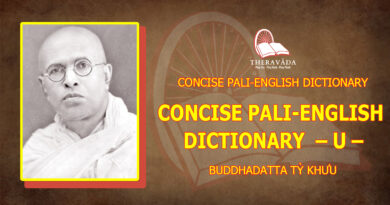THE PATTHANUDDESA DIPANI – CHAPTER 9: UPANISSAYA-PACCAYA
THE PATTHANUDDESA DIPANI – CHAPTER 9: UPANISSAYA-PACCAYA
The relation of sufficing condition is of three kinds: objective sufficing condition, contiguous sufficing condition and natural sufficing condition. Of these three, the first is the same as objective dominance, and the second as contiguity.
What is ‘natural sufficing condition’? All past, present and future, internal and external, classes of consciousness together with their concomitants, all material qualities, Nibbána and concepts (pannatti), are natural sufficing conditions, severally related, as the case may be, to all the present classes of consciousness and their concomitants.
Here, the Buddha who passed away and has entered Nibbána, His Dhamma, the Fraternity of His sanctified disciples, and the successions of the recognized Fraternity, are causally related to us, of later generations, by way of natural sufficing condition, for the cultivation of good. In the same way, our forefathers, in their respective capacities as parents, teachers, wise monks and Brahmins, eminent philosophers, and powerful and august kings, are also causally related to the succeeding generations by way of natural sufficing condition, either for the cultivation of good or of evil, or for the experience of pleasure or of pain. For which reason,, they established or propounded various laws and sayings, moral and immoral, and also worldly institutions–both for the welfare and otherwise of the succeeding generations. The future generations also follow their paths and adopt their customs by doing acts of charity, by observing the precepts, and so forth, by practicing the moral and social laws of the world, by adhering to various religious beliefs, by taking up various kinds of occupations, by studying various branches of arts and science, by governing hamlets, villages and towns, by being agriculturists in the field and on the farm, by digging lakes, ponds and wells, by building houses, by making carriages and carts, by building boats, steamers and ships, and by seeking for and accumulating wealth, such as silver, gold, precious stones, pearls and so forth and so on. Thus the world has developed unceasingly.
The future Buddha (Metteyya), His Dhamma and His Fraternity are natural sufficing conditions, being causally related to the present generation, for the acquirement of virtues, and the gaining of merit. Supremacy, wealth, power, prosperity–which are to be gained in the future–are also natural sufficing conditions, related to the present generation for the putting forth of efforts of all sorts. The acquirement of happy existence and wealth and the attainment of Path, Fruition and Nibbána, which are to be enjoyed in the future, are also natural sufficing conditions, related to the present generation of men for the development of such forms of merit as charity, virtue and so on.
With the hope of reaping crops in winter, men till the soil and sow seeds in the rainy season, or they do various kinds of work, which incur labor and intellect, with the hope of getting money upon their completion of the work. Now, the crops to be reaped and the money to be got are future natural sufficing conditions, related to the acquisition of crops and money. In the same manner, most people in the present life do many good deeds, realizing that they will reap the fruits of their deeds in some life hereafter. In this case, the fruits, which will be reaped in future, are future natural sufficing conditions, related to the deeds done in the present life. Deeds done before are also past natural sufficing conditions, related to the fruits, which are to be reaped in the future. Thus we see that the future natural sufficing condition is as large and wide as the past.
The living Buddha, His Dhamma, and so on, are present natural sufficing conditions, being related to the present living men, Devas and Brahmas, and so are living parents to living sons and daughters, and so on. The present natural sufficing condition is thus obvious and easy to understand.
Internal natural sufficing conditions are those that exist in an animate person, such as the Buddha, and so forth. External natural sufficing conditions are conditions, such as lands, mountains, rivers, oceans and so on, which serve as resting places for the existence of life (sentient beings); or such as forests, woods, trees, grasses, grains, beans and so forth; or such as the moon, the sun, the planets, the stars and so on; or such as rain, fire, wind, cold, heat, and so forth, which are useful and advantageous to life in one way or another. All these are the more powerful sufficing conditions, either for the accomplishment of good or for the spreading of evil; either for the enjoyment of pleasures or for the suffering of pains.
Those with an earnest desire to enter Nibbána in the present life work out the factors of enlightenment. Those with an ardent hope to enter Nibbána in the lives to come when Buddhas will appear fulfill the perfections. Here, Nibbána is the more powerful sufficing condition for the cultivation of these tasks.
A large variety of concepts or names-and-notions, commonly employed, or found in the Tipitakas of the Buddha, are also sufficing conditions for the understanding of many things.
In fact, all conditioned things here come to be only when there are present causes or conditions for the same, and not otherwise. And they stand only if there are present causes for their standing; otherwise they do not. Therefore, causes or conditions are needed for their arising as well as for their maintenance. However, Nibbána and concepts are things, unconditioned, without birth and genesis, everlasting and eternal. Therefore, no causes are needed for their arising and maintenance. [1]
The Moral is causally related to that which is moral by way of sufficing condition. A clear exposition of this is given in the Patthana, where it is said: “Through faith one gives charity, observes the precepts and so on.” Similarly, that moral is causally related to immoral–and unspecified [2] or unmoral to unmoral–by way of sufficing condition is made clear by these expositions: “Through lust one commits murder, theft and so on,” and “Through suitable climate and food, one enjoys physical health and so forth.” The Moral is also causally related to that which is immoral by way of more powerful sufficing condition. This is to be understood from the following exposition: “One may give charity, and thereupon exalt oneself and revile others. In the same manner, having observed the precepts, having attained concentration of mind, and having acquired learning, one may exalt oneself and belittle others.”
The Moral is also causally related to that which is unmoral by way of more powerful sufficing condition. All good deeds done in the four planes (these four planes are the spheres of Kama, Rupa, Arupa and Lokuttara), and all actions connected with doing good, are related, by way of more powerful sufficing condition, to un-morals of the resultant kind, producible at a remote period. Those who practice for the Perfection of charity, suffer much physical and mental pain. Similarly, those who practice for such other Perfections (Paramita) as of morality, abnegation, wisdom, perseverance, patience, sincerity, resolution, love, and resignation, suffer the same. It is likewise with those who practice the course of Jhana and Magga (“supernormal thought” and the Path).
Immoral’s are also causally related, by way of more powerful sufficing condition, to morals. For instance, some on this earth, having done wrong, repent their deeds and better themselves to shun all such evil deeds, by cultivating such moral acts as giving charity, observing the precepts, practicing Jhanas and Maggas. Thus the evil deeds they have done are related, by way of stronger sufficing condition, to the moral acts they cultivate later.
Immoral’s are also causally related, by way of more powerful sufficing condition, to un-moral’s. For instance, many people in this world, having been guilty of evil deeds, are destined to fall into one of the four planes of misery, and undergo pains of suffering which prevail there. Even in the present life, some, through their own misdeeds or the misdeeds of others, have to bear a great deal of distress. Some, however, enjoy a large variety of pleasures with the money they earn by their misconduct. There are also many who suffer much on account of lust, hate, error, conceit, and so forth.
Un-morals are also causally related by way of more powerful sufficing condition to morals. Having become possessed of great wealth, one gives charity, practices for the perfection of good morals, fosters wisdom, and practices the religious exercises in a suitable place, such as a monastery, a hollow place, a cave, a tree, a forest, a hill, or a village, where the climate is agreeable and food is available.
Un-moral’s are also causally related by way of more powerful sufficing conditions to immoral’s. Being equipped with eyes, many evils are born of sight within oneself. A similar explanation applies to our equipment with ears, etc.; so also as regards hands, legs, swords, arms, etc. It is thus that sufficing condition is of three kinds.
Sufficing condition by way of Suttanta [3] may also be mentioned here. It is found in many such passages in the Pitakas as, “through intercourse with virtuous friends”, “through association with sinful companions”, “by living in the village”, “by dwelling in the forest”, and so forth. In short, the five cosmic orders (Panca-niyamadhamma) are the stronger sufficing conditions relating to the three worlds–the animate world, the inanimate world, and the world of space, to go on unceasingly through aeons of time. This also has been expounded at length by us in the Niyamadipani [4].
Why is arammanupanissaya so called? It is so called because the dominant object acts as a main basis for subjects (arammanika).
Why is anatarupanissaya so called? It is so called because the preceding consciousness acts as a main basis for the arising of its immediate succeeding consciousness. The preceding consciousness is just like the mother, and the succeeding one, the son. Here, just as the mother gives birth to the son who owes his existence to her in particular, so also the preceding consciousness gives birth to the succeeding one, which owes its existence particularly to its predecessor.
Why is pakatupanissaya so called? It is so called because it is naturally known to the wise as a distinct sufficing condition. Here, something further requires to be said. The influence of a sufficing condition in contiguity pervades only its immediate successor, but that of a natural sufficing condition can pervade many remote ones. Therefore, what in this present life has been seen, heard, smelt, tasted, touched and experienced in days, months, years, long gone by, takes form again at the mind-door, even after a lapse of a hundred years, if a sufficient cause is available. And so people remember their past, and can utter such expressions as “I saw it before”, “I heard it before”, and so on. These beings, whose birth is apparitional [5], also remember their former existences; likewise, some among men, who are gifted with the memory of their former existences, can do so. If one out of a hundred thousand objects experienced before be met with afterwards, many or, it may be, all of them reappear in the process of thought.
[End of the Upanissaya-Relation]
FOOTNOTES AND REFERENCES:
[1]:
That is to say, Nibbána and concepts (or more properly, concept-terms) do not enter time, and therefore are not subject to time’s nature, change. They do not “arise”; therefore they do not “cease”. They are “everlasting and eternal” in the sense of being extra-temporal, not in the vulgar sense of being endlessly continuous in time.
[2]:
Here abyakata is rendered as “unspecified” or “unmoral”. It is explained in the commentary as Kusala-akusalabhavena akathita, annabhavena kathita; i.e., not to be called as moral or immoral, but to be called as “apart-from-both”, i.e., unmoral or unspecified. The abyakatadhammas are–All classes of resultant and inoperative consciousness and all material qualities, as well as well as Nibbána. Translator.
[3]:
That is “sufficing condition” as set forth in the manner of the Suttas or general discourses of the Buddha, as distinguished from the manner in which it is dealt with in the Abhidhamma section of the Scriptures.
[4]:
Niyamadipani was written by the late Ven. Ledi Sayadaw and translated into English by Ven. U Nyana and Dr. Barua.
[5]:
Beings whose coming into existence takes place in any other mode than the ordinary one of birth from parents; what occidentals might call “supernatural beings” though not all of them are to be understood as superior to man in any vital respect. Many are inferior to man, in power and faculty, as well as in the opportunities open to them of winning Nibbána. Translator.









